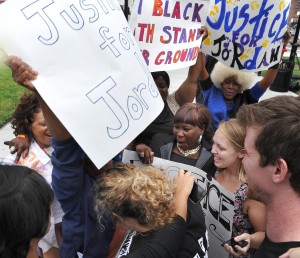Verdict in ‘loud music shooting’ may carry race-relation ramifications

Jurors reached a unanimous verdict of “guilty of first-degree murder” in the trial of Michael Dunn, ending nearly two years of legal proceedings following the shooting of unarmed African-American teenager Jordan Davis on Nov. 23, 2012.
Davis was fatally shot in an altercation outside a gas station in Jacksonville, Florida, in which Dunn told Davis and three other teenagers in an SUV to turn down their music. When they failed to do so, Dunn fired upon the teenagers’ vehicle, missing the others but fatally hitting Davis.
After the shooting, Dunn failed to call 911 about the incident, instead returning to his hotel and ordering a pizza, according to court records.
Although Dunn’s defense alleged that Davis had threatened him with what looked like a shotgun, police evidence and witness testimonies pointed to the contrary, leading to the court’s verdict of Dunn.
Dunn was also found guilty for the attempted second-degree murder of the other three teens, and based on Florida law, he will likely remain jailed for life.
Despite the guilty verdict, many questions have stemmed about whether the Davis case may have larger ramifications in the world of race relations, especially in light of other high profile killings of African-American teens, such as the shooting of unarmed Trayvon Martin on Feb. 26, 2012, or the recent shooting of Michael Brown by police officers on Aug. 9.
“The fact that (Davis) was initially asked to turn down his music says a lot about the unacknowledged offensiveness that working class blacks may carry,” Jason Hill, a DePaul professor of philosophy and race relations, said. “There’s a certain perception of ‘Africanness’ that needs to be defused.”

The racially charged motive of Dunn’s attack has become clearer in the two years following the shooting. A series of letters written by Dunn during his period of imprisonment awaiting trial were released by the State Attorney’s Office earlier this year.
“This jail is full of blacks and they all act like thugs … This may sound a bit radical, but if more people would arm themselves and kill these (expletive) idiots when they’re threatening you, eventually they may take the hint,” Dunn wrote.
Elijah Obasanya, a member of MOVE, a group that explores African-American stereotyping, described his thoughts on this tradition of labeling.
“It’s saddening that black youth are often not viewed as mature people and given the benefit of the doubt,” he said. “Our actions — or even presence — are often viewed as if we intend malice. We need to more consciously hold people accountable for these prejudicial attitudes.”
Despite the sentiment carried by Dunn and other perpetrators of violence against black males, some critics say that the verdict of the trial may be a step in the right direction.
“(Achieving) a post-racial society really depends on how narrow we define it,” Hill said. “Complete colorblindness will likely never exist. But in other ways we are improving. Race doesn’t define one’s future as much as it used to. We don’t allow race to define so much about who is worthy of merit, of justice.”
Referring specifically to the case, Hill commented, “In front of a predominantly white jury, the case creates a strong message that no matter what a situation may be, justice can still be served.”

